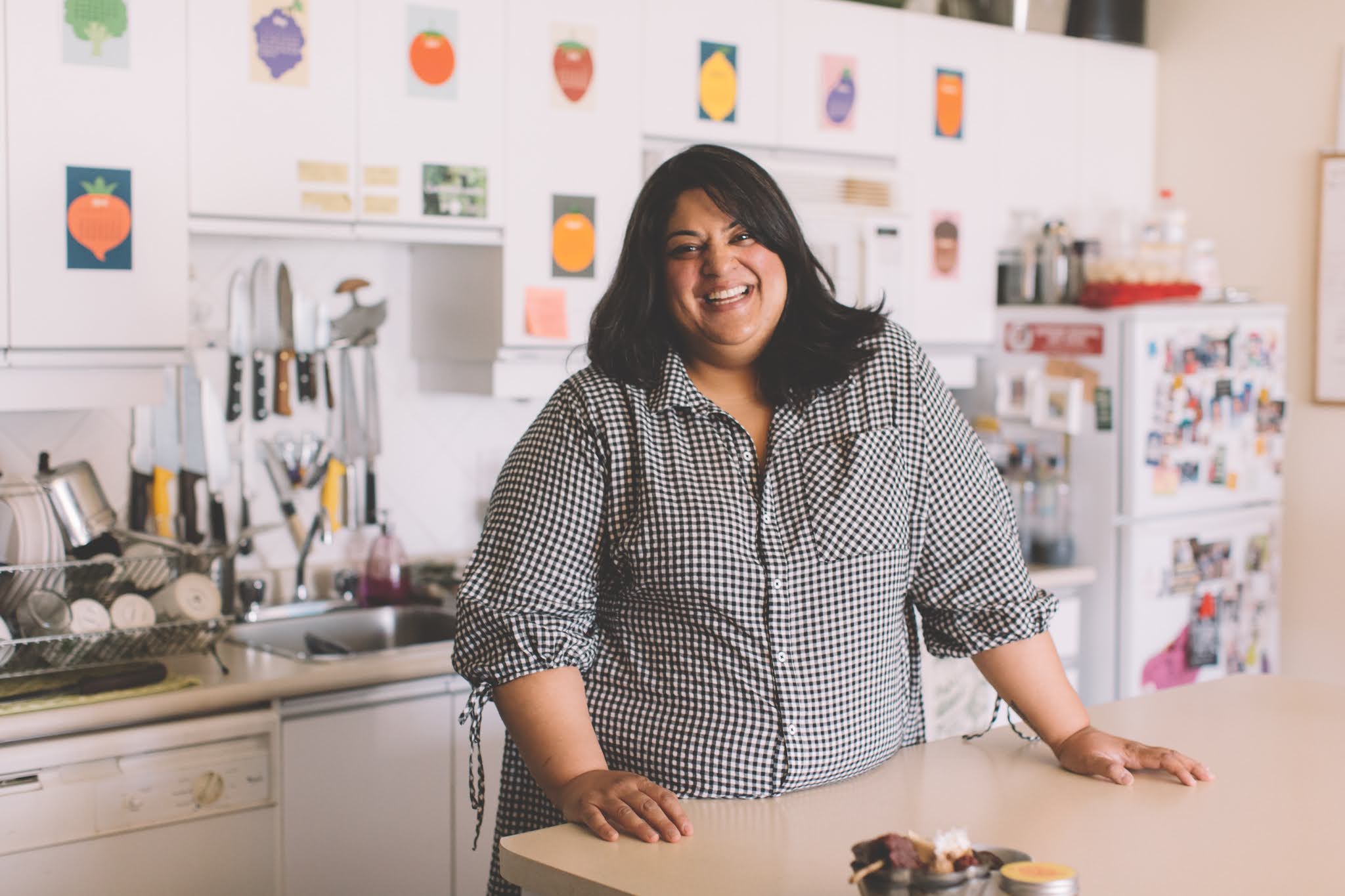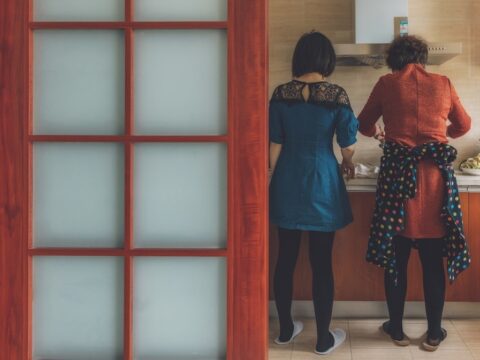Joshna Maharaj was an idealistic 24-year-old graduate of religious studies facing an existential crisis and no job prospects when she left home in Toronto to live in an ashram in the remote foothills of the Indian Himalayas. She found herself that year — not in the mountains where she expected to but in the kitchen.
At the end of her year in India, Maharaj traded in a pious white sari and the chance to become a nun for a professional chef jacket and an admission to culinary school — the start of a long career as a chef and activist fighting for Canadians’ right to healthy, scratch-made and delicious food in public institutions such as community food centres, hospitals, schools and prisons.
You may unsubscribe from any of our newsletters at any time.
Maharaj spoke to Claire Sibonney about food justice, her new book, Take Back the Tray, and what it’s like being the “loud brown woman” in the room.
CS: What is the connection between spirituality and food for you?
JM: In a Hindu context, which is what I was born and raised in, every bit of food that arrives on a plate in front of you is some sort of spiritual blessing. But the magic came together for me when I was working in the kitchen at the ashram. We sat barefoot on the floor because the kitchen is considered a sacred space. We chopped vegetables in our lap. There was nothing formal or professional about any of this. I remember so clearly watching the way emotion actually imbued itself into the food.
CS: Your first full-time chef job was at The Stop Community Food Centre in Toronto, making lunches for people who didn’t have access to good, wholesome, nutritious food. What inspired you to work in community food security from the get-go?
JM: My heart leanings have always been toward community and people. For every vision of a restaurant that I ever had, both my dad and one of my uncles would be like, “Honey, you don’t want a restaurant. You want to open a soup kitchen.” When I was presented with the chance to take a job at The Stop, I said to myself: whatever happens, you’re going to figure out a way to be the best chef that you can be. The way I cook doesn’t have to be informed by how much people are paying for the food, because the financial transaction is the least meaningful element.
Food has much more power than we’re giving it. We could actually nurture these folks with the food we serve to support the best version of themselves walking out the doors.
CS: In Take Back the Tray, you describe seeing prepackaged food at a hospital kitchen being propped up with cornstarch as “Weekend at Bernie’s cooking” — basically a plot to dress up the food so it doesn’t look quite so dead. What was that like?
JM: I had this sense of doom as I looked around and understood what I was seeing. Watching the deliveries come in, all in cases of cardboard on a skid covered in shrink wrap that went directly into the freezer. Or these weird tubes of ground beef that were used to make meatloaf, or chicken that was pre-cooked with fake grill marks on it. But the thing that really bothered me was seeing the price list and how much money has been spent on this system. The truth is, it’s actually not that much cheaper than made-from-scratch cooking, which offers all of the human connection, the fact that the food is actually nourishing somebody’s body. That kitchen [with its neglected pots and equipment] told the story of a time when real food was being cooked, and the staff still remembered it, before the people with power decided these things are no longer important.
CS: You mention food reform in the prison system, too, which is probably the last place most people would think about improving. Why?
JM: This is all anchored by a conversation about whether a person surrenders their human rights when they become convicted. Many people seem to think the answer is yes, and our cultural understanding says yes, that you are less human when you are in a prison because of whatever you’ve done to get in there. I believe that hospital food should promote wellness and healing, and that school food for students should encourage academic excellence. Prison food, in some way, needs to promote rehabilitation. Food has much more power than we’re giving it. We could actually nurture these folks with the food we serve to support the best version of themselves walking out the doors.
More on Broadview…
- Why all grocery stores should offer quiet hours
- Subhra Mukherjee is bringing food to seniors who need it
- Priscilla Settee on building a better social safety net
CS: You were among the top 20 finalists for the Basque Culinary World Prize for social gastronomy, which is a big deal. What is that movement all about?
JM: It’s about chefs just doing what we do to create a fair and sustainable way to live and a vision for the world. After the recent devastating blasts in Beirut, José Andrés and the World Central Kitchen were feeding people, buying and making local food as opposed to airlifting in some standardized beef stroganoff or something like that. The team was using local everything to put it together. People like Andrés have proven that what makes us chefs makes us easily able to jump into moments like this because we can always figure it out. Like, “Oh, there are 200 people coming for dinner and there’s no running water and only half as many tables as we need. Good luck!” Our service is like that. We’re very good and very nimble at pivoting and adjusting and pulling people together and figuring it out. To think about this space and life outside the confines of the restaurant is exciting. It’s incredibly powerful.
CS: Do you ever get to use that religious studies degree?
JM: Perhaps the most useful bit of wisdom is that if I want to actually motivate people’s behaviour, I have to focus on what they believe, to connect to how they view the world or what they want for their families. You’ve got to get to people’s hearts — I mean a connection with food and blessings and gifts, and a sort of energetic relationship with divinity, however it looks for you.
I think there’s a need to rethink what we’re doing, especially in a moment like this that’s so full of heartbreak and uncertainty.
CS: What’s next for you?
JM: One of my dreams is a training facility where I could coach chefs who want to do this kind of work. The hope is that Take Back the Tray could be the foundation of a curriculum. There are things about doing this work that you don’t learn in culinary school. As these books get out there, institutions are like, “This makes so much sense; let’s make this change,” but who’s going to help achieve this? My optimistic thinking is saying, wouldn’t it be great if there were chefs who have been trained in putting this practice in place?
This interview has been edited and condensed for length and clarity.
This interview first appeared in Broadview‘s December 2020 issue with the title “Food Fighter.”
We hope you found this Broadview article engaging.
Our team is working hard to bring you more independent, award-winning journalism. But Broadview is a nonprofit and these are tough times for magazines. Please consider supporting our work. There are a number of ways to do so:
- Subscribe to our magazine and you’ll receive intelligent, timely stories and perspectives delivered to your home 10 times a year.
- Donate to our Friends Fund.
- Give the gift of Broadview to someone special in your life and make a difference!
Thank you for being such wonderful readers.
Jocelyn Bell
Editor/Publisher














The true cost of food is not the ingredients, it’s the preparation. Soup kitchens can offset these costs with volunteers. Hospitals, schools and prisons are driven by unions, therefore the costs of labour are far higher than those of a nonunionized food prep company, who can also “standardize” a meal for dietitian demands.
In theory I appreciate her ambition.